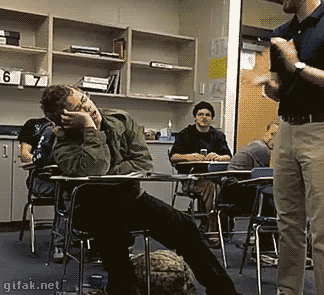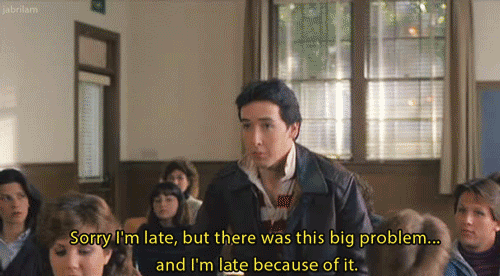During my first semester of college, I had a professor who I was fully convinced had a vendetta against me. He must have used entire sets of red pens marking up my papers, and somehow knew to call on me every time I hadn’t done the reading. I swore he was telepathic. Near the end of the semester, something strange happened – he actually complimented my writing, and without any apparent sarcasm. At that point I realized that his critiques were supposed to be crafting me into a better writer, not ripping my self-esteem to shreds. He could have been a great resource if I hadn’t spent the semester avoiding him.
Students and professors, like any other relationship, are bound to fall into misunderstandings – and we might be missing out on more than we realize. Here are some things that professors appreciate about students, and some things that just drive them up a wall.
1. When we don’t value their time

“It bothers me when a student seems to think that I have more time to look up something on Canvas or another website than they do!” said Dr. Jan Dormer, professor of TESOL at Messiah College.
As a student, it’s easy to fall into the trap of thinking we’re leading the busiest lives imaginable. I already have two jobs and an internship and a ton of crap to do for all of my classes—and he gives us a paper on top of all that? Why does he hate me?! Sure, it might take a couple of hours to pump that paper out—but at the end of the day, they’re also walking home with a back-breaking ton of papers to grade. When we ask questions we can easily find the answers to, we show a disregard for their time and it sends a subtle message that our lives are more important.
2. When our heart’s in the wrong place

“I dislike it when I sense the student is more concerned about their grade than actually learning,” said Dr. Dormer. And let’s be real—this happens to the best of us, especially when we’re taking a gen ed or a class we’re not really passionate about. It’s easy to check out and focus on getting that A (or just a passing grade) rather than really learning the material. But apparently, professors can tell when our heart’s not in it, and that must be really de-motivating to teach.
3. When we treat them like they have the plague

This one is kind of a no-brainer—professors like it when students ask them questions. Yet, for some reason, many students rarely make an effort to talk to their professor outside of class. They’re content instead to attend class, collect their grade, and leave without ever having a meaningful interaction with their instructors. “I really like it when students go out of their way to really learn from me and my class, both by asking questions in class and by coming to see me,” said Dr. Dormer.
4. When we don’t communicate

Until this year, I never really thought to question the grades I was given. The professor’s word was law when it came to exams, papers and assignments, and to debate their authority would be like arguing with God. It wasn’t until my junior year that I realized grades are often a hazy area, and good communication can sometimes change the tide. “I really like it when students take the time to read my comments on their papers, and want to come in and talk with me about them – not to get a better grade, but to really learn. Ironically, it is that student whose grade I will change,” said Dr. Dormer.
5. When we play the blame game

So your professor assigned you yet another group project. By the time we’re in college, we know how these work and exactly what role we fill. There’s always going to be one person that bears the weight of the assignment while everyone else gets to benefit from a free grade – and if you’re that studious scholar, it’s pretty much the worst. Protesting against this educational mind game by whining about your group partners to your professor, however, will not get you far.
“This just comes across as not taking responsibility,” said Dr. Dormer. Group projects can be an opportunity for you to figure out how to work with a team of people you might not get along with, which is a good test for the real world after graduation. Instead of getting your professor involved, try taking responsibility for leading your group and see if you can convince even the slacker to pull his weight.
6. When we act above it all

Professors are people, too. Which means they realize that as college students, we have a lot on our plates—sometimes more than we can handle. Once in a while, this will reflect in poor performances on a quiz or completely blanking on last night’s homework assignment. “If you ask for an extension on your paper, I’m going to be looking at your attitude,” said Dr. Simcox, a communications professor at Messiah College. “If you can’t make a deadline, you’d better be distraught when you come and talk to me. That will go over a lot better than if you’re just laughing and joking around about it.”
7. When we lie and make excuses (which are usually lies)

It all started in elementary school with “I forgot my backpack on the school bus.” By the time college rolls around, we’ve had years of practice in formulating legitimate-sounding, totally-not-a-lie excuses. But whether we’re creating some kind of undetectable (but totally real) illness, or faking a vague family crisis, professors can often see right through the tales we thought up as we were walking to class. And as counter-instinctive as it might sound, honesty will actually take us a lot further. Dr. Simcox emphasized that explaining the truth for why we missed a class will help build trust, even if an excuse sounds a whole lot better than the real reason (which, for me, is usually that I slept past my alarm).
8. When we’re lazy

“It really annoys me when students email me saying they can’t find something online when it is right where I told them it was—especially when I bring up the website in class and show them exactly where to go,” said Dr. Dormer. Being lazy might be second nature to many of us college students, for whom naps and Starbucks is our lifeblood, but at the end of the day, this is our education.
I’ve seen it happen in many of my classes: once we realize the professor recaps most of the reading material in the powerpoint, we start skipping steps. I’ll skim the article instead of taking notes, or just read the Sparknotes summary of a book. It’s easy to make college about convenience and ask our professors to pick up our slack by showing us the shortest road possible. But professors can tell a lazy student from a genuinely confused one, and the difference is the split between a professor who wants to see you succeed and a professor who just wants to see you leave.
9. When we expect the Baby Treatment

By the time we get to college, most of us are adults—yes, even the freshmen. As shocking as this might sound, professors don’t want to baby us. “When we simply treat each other like adults, it works out rather nicely. Unexcused absences very rarely prove to be a problem, nor do I get lame excuses for them,” said Dr. Joseph Huffman, a history professor at Messiah College.
His strategy is to outline his attendance policy at the beginning of the semester and make students sign a contract for their grade. They pledge to work towards an A, , or C, depending on how confident they are in their historical abilities. This is Dr. Huffman’s way of creating an adult system where our expectations are clearly defined, and we know exactly how many times we can be absent without it affecting our contract. We pick our grade, and then work towards it—and I will say, I never skipped one of his classes. If professors want students to be responsible, they treat them like adults—and it saves a lot of problems for everyone.
10. When we make Professors the Police

If professors wanted to be police officers, they would have gone into law enforcement. Period. “Whatever is missed is missed and the student makes a choice to allow this to negatively affect their academic progress in the course…I can live with that,” said Dr. Huffman. They don’t want to have to chase us down any more than we want them to chase us down. They’re not our parents or the police. At the end of the day, if we missed the information we’re paying for, we might as well be throwing dollar bills in the wind. A lot of dollar bills.
The Passing Grade: A Guide to Interacting with Your Professors
Written by Nicole Eisenberg, freshman, University of Maryland
It is a common misconception that all professors are out to get us, that they sleep better at night when at least fifty percent of their classes are failing, and that they enjoy referring to us by the colored shirt that we are wearing. Professors really do teach because they care and because they want us to succeed! Sometimes, it may seem as if they are giving you the stink eye, but if you follow these few simple steps, your professors will greet you with a smile when you walk in the room!
How to get your professors to like you
1. Do not be late

Being late is a sign of disrespect for your professor; it is a way of saying that he or she is not important enough for you to wake up to your alarm the first (or second or third) time. The easiest way to make a good impression is to be on time. Being late is to be late, being on time is to be late, and being early is to be on time. If you’re sliding into your seat right as the lights are being turned down, you will still be considered late. All you need to do is leave an extra five minutes, and that will show your professors that you care too.
2. Choose a seat towards the front of the room

Not only will it help you focus more, but sitting in the first few rows of the room will tell your professor that you want to be engaged in the topic of study. It will also enable you to interact in class discussion and have your questions answered.
3. Go introduce yourself

I realize that the semester has already begun, so if you have not already introduced yourself to all of your professors, take a few minutes to go say hello after your next lecture. Why would you settle for a number when you can be a name? Each person is different, so many professors may not remember your name after only one encounter, but they will now remember your face as you sit enthralled during discussions. Others, however, will remember your name for the rest of the semester and beyond.
4. Talk to them

It can be pretty lonely standing up behind a podium with four hundred students staring at you like you are an alien, so make them feel comfortable in their own classrooms. Ask them how their weekends were, make small talk, and discuss the weather, or ask them about a question you have on the material. Dr. Hugh Turner, Ph.D., a professor in the Robert H. School of Business at the University of Maryland, College Park, said “[I] enjoy office meetings and encourage current and past students to visit ‘just to say hello‘ when the opportunity is there for them.” Email is also a great tool to use to talk to your professors because you will often get a quick response, and they can still make the connection that you are trying to succeed in their classes.
See? It is actually a lot easier to get on your professors’ “good lists” than it is to be put on their list of “destined for ‘F’s.” Just make that extra little effort, and your GPA should be sitting pretty—as long as you put in the required time and work!
*Updated February 20, 2015 by Nicole Eisenberg to include “The Passing Grade: A Guide to Interacting with Your Professors”



















